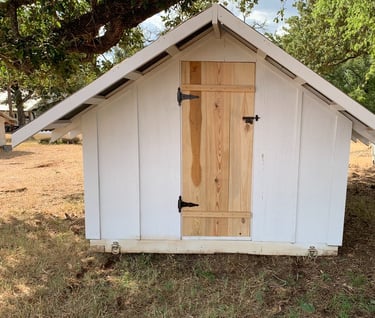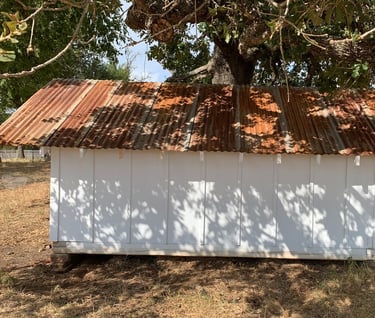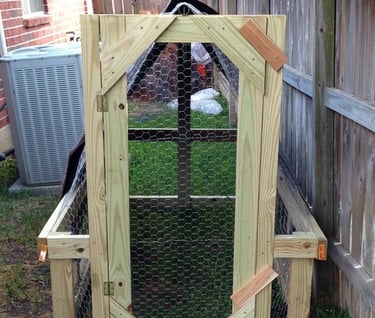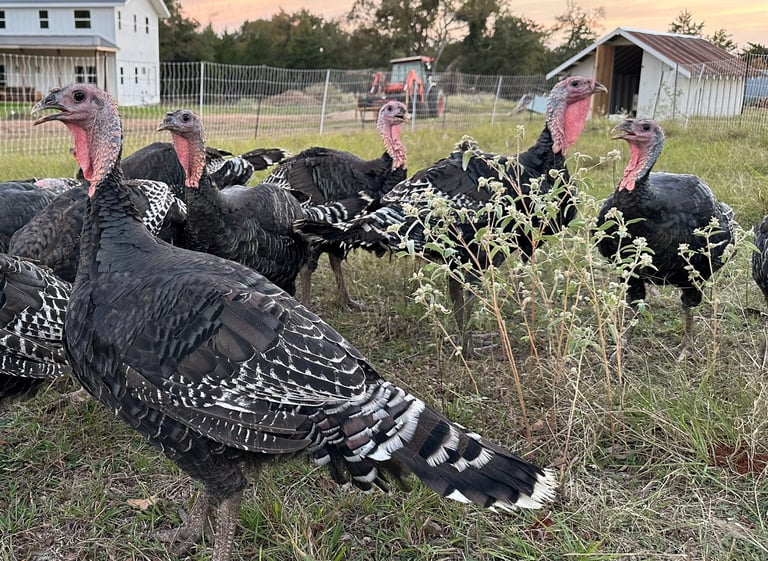Mobile vs. Fixed Coops
Which one is better for pastured poultry?
CHICKENSTURKEYSHOUSING


Mobile vs. Fixed Chicken Coops
Choosing the Right Option for Pastured Poultry
No matter how you choose to raise your poultry, shelter is one of the biggest considerations to keeping your flock safe. There are a TON of different options available and will range from very simple for small flocks to deeply intricate for large ones. For my purposes here, I want to discuss two options that I have used (and still use) on my property for my birds: Mobile coops and fixed coops!
So that everyone is on the same page, a mobile coop is one that you will move from place to place, whereas a fixed coop will remain in one place for long periods of time - perhaps permanently. To be clear, both mobile and fixed coops have advantages and disadvantages, and you will need to consider your personal situation to determine what would be best for you. In this article, we will explore my personal pros and cons of utilizing both mobile and fixed chicken coops and how I have used them to produce pastured poultry and eggs.
Mobile Chicken Coops:
Mobile chicken coops have a variety of names across the industry: chicken tractors, pasture pens, poultry wagon - ok, I might have made that last one up... These structures, regardless of what they are called are moved routinely across a pasture, providing birds with fresh grass. They are typically lightweight and designed with wheels or skids for easy transportation although there are some VERY large coop options that must be moved with a tractor or truck. In my experience, these are some of the pros and cons of using mobile chicken coops:
Pros:
Much Easier Rotational Grazing: One of the primary advantages of mobile chicken coops is their suitability for rotational grazing systems. Chickens are moved daily (sometimes twice daily) onto fresh pasture. This accomplishes several things including improved pasture health, reduced parasite and disease pressure, and optimal utilization of forage resources.
Better Manure Spreading and Natural Fertilization: As the coop is moved across the pasture, the chickens not only peck at the grasses and bugs, they poop - which in moderate amounts can be REALLY good for the pasture! This natural fertilization enhances soil fertility which produces a healthier forage for the next time they come around to that piece of ground. The movement of the coop ensures that manure is spread evenly. Again - this is good in moderation, but it will scorch your ground in large amounts.
Systematic Pest Control: Mobile chicken coops help to eliminate pests that are inhabiting your fields. As the coops are moved along, the chickens scour the ground eating all sorts of bugs, including harmful pests. As the coop occupies a small section of ground, the birds go to work - and like a patrol line moving their way through a city, they root out the pests one by one.
Cons:
Birds Have Limited Space: One of the things that I struggle with using mobile coops is that they offer a smaller living space. If you have a breed of bird that doesn't do as well in these confined spaces, it can cause animal stress and even violence between birds. This will negatively impact your production - whether you are raising meat or eggs. I personally feel that mobile coops can tend to compromise the birds' comfort and welfare.
Additional Labor: Moving the mobile coop requires physical effort and time. No, it isn't hours upon hours of time spent - unless you have a whole bunch of mobile coops - but it is a labor consideration. You also must consider that you may have to move the coops multiple times per day - depending on the number of chickens in the coop.
Limited Protection: Mobile chicken coops tend to offer less protection against predators compared to fixed coops. We have had birds that were attacked by raccoons in the chicken tractor, having their wings ripped off through chicken wire - it wasn't pretty. That said, this can be mitigated by utilizing a smaller mesh chicken wire or even hardware cloth in the construction of the tractor. You could also employ electric wire around the perimeter of the coop.
Fixed Chicken Coops:
Fixed chicken coops have been called stationary coops and chicken/hen houses. These are permanent structures that remain in one location permanently - or at least through the duration of the flock's life. Let me unpack the pros and cons that I have experienced with fixed coops:
Pros:
Ample Space and Accessibility: Not always, but for me, my fixed chicken coop offers better space and even some storage than my mobile coops. This additional room provides chickens with greater comfort which reduces overall stress. My fixed coops are also generally easier to access and work in... I have full size doors to get in and out which makes life easier on several levels.
Enhanced Predator Protection: My fixed coop is quite a bit safer than my mobile coops. The walls are solid, the doors are secure and predators have a much harder time gaining access to the birds inside. If you have an automatic coop door, then you can almost create the Fort Knox of chicken coops!
Climate Control: We are in Central Texas, and y'all, it is HOT. In my fixed coop, I have wired up fans to promote air circulation for those unbearably hot days. This provides the birds with a bit of a reprieve from the oppressive heat. Additionally, in the rare instance that it snows, it shelters the birds from that as well. Don't laugh, in 2021, we had what we called "Snovid" where we got 8 inches of snow. It was wild. It also gave me a much greater appreciation for farmers in the Northern part of the USA.
Storage Options: My fixed coop has a space where I store feed, supplements, and equipment like lights, feed troughs, etc. which enhances it's functionality.
Cons:
Limited Grazing Area: If you have a fixed coop, then you almost always restrict chickens to a defined grazing area. This has always resulted in overgrazing in my case. It might just be that I am lazy with that coop - but when you have a full time job, it is hard to manage all of that. The result is that the pasture that they have access to is pretty much free of grass and full of plants that they don't like to eat.
Manure Accumulation and Cleaning: I mentioned that mobile coops help spread manure, but this is not the case with fixed coops. Manure will accumulate - and it can get messy. Remember, all things in moderation. Too much poop = excess nutrient buildup, increased parasite and disease pressure, and negative impacts on soil health. Chicken manure is "hot" in the composting world, and it can negatively impact plants in high levels. It must be in smaller quantities, or sufficiently composted. Regular cleaning and manure management practices are necessary to maintain a healthy and hygienic environment. I have tried a variety of things to help keep these coops cleaned - but it is all about time. Can you commit the time to make it happen?
Potential Soil Degradation: This is tied to the last two points, but having your birds in one spot can be harmful to the land. There will likely be soil compaction from the coop itself AND from repeated traffic over the entire area - both from man and beast. Chickens also like to take dust baths, so when left to one area for too long, they will bathe in the same spot over and over, creating little craters all over your pasture. They can be unsightly and also cause you to roll and ankle or worse.
How do we utilize coops for our pastured poultry?
I said at the beginning of this article that you are going to have to choose what works best for your setting. If you have a little backyard flock, you will likely not be able to manage a mobile coop - it will be fixed coop for you. For us, we wanted to try and accomplish the best of both worlds. I built a coop that is somewhat of a hybrid (Pictured above - and check out the video of me building it below). I wanted to security of a fixed coop but the mobility of a mobile one. What I came up with was a 16ft by 8ft coop that I can move from spot to spot. This is labor intensive, but I do not move the coop every day. When I have a flock, I will move the coop once a week to prevent manure buildup - especially in the coop because they poop all night.
Additionally, because I do not like having my birds cooped up in such a small space for their lives, I have an electric net fence that I create a pasture for them to free range on. Each night, I lock the birds in the coop to protect them from predators and in the morning I let them out to roam a sizable pasture. We aim for a minimum of 20 square feet of pasture per bird - hopefully more. The nice thing about this is that they have a large area to roam and the pasture gets moved whenever I move their coop, so they always have fresh grass to forage on.
I have said this to people when they ask, but I think that our chicken is a bit juicier than other farms because our birds get so much exercise. They are often seen running around chasing bugs and pecking at the ground. They chase one another if one has something that the others want, and they travel all over the pasture. I think that this makes the meat exceptionally succulent. This is the only way that I will personally raise meat birds.
Hopefully my experiences of the pros and cons of each system helps you as you consider what is right for your application. Whatever you choose to do, make sure to prioritize animal welfare and good land management strategies and you will produce high-quality, nutritious meat and eggs for your family!













